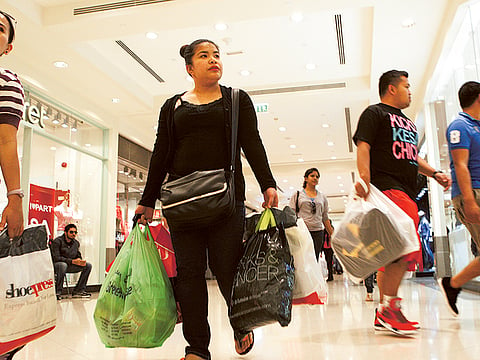VAT an inevitable transition for UAE economy
Pressure from lower oil prices makes reform necessary

Abu Dhabi: The introduction of Value-Added Tax (VAT) in the UAE is a step in the right direction for the country’s economy and an inevitable transition, analysts said.
Alp Eke, senior economist at the National Bank of Abu Dhabi, said that such initiatives like implementing taxes are becoming “necessary” especially at a time when plunging oil prices highlight the importance of diversification.
“The UAE is expected to register a budget deficit of 5-6 per cent of [gross domestic product] in 2015, and revenue-increasing measures such as subsidy removal and taxes are necessary. The UAE must diversify its revenue resources,” he told Gulf News.
Eke pointed that the idea of introducing taxes in the GCC has already been discussed by international institutions like the International Monetary Fund and the World Bank, which warned that the region will have to introduce such reforms.
“In 2015, for the GCC region, oil revenues are estimated to constitute 65 per cent of government revenues and the GCC region is expected to register a fiscal deficit of circa 11 per cent.
This clearly indicates a very high reliance on oil revenues and as a result, points to significant vulnerability. Hence, given current macroeconomic conditions, GCC governments need to find other ways to broaden their revenue base away from oil and hence, balance their fiscal budgets,” he said.
According to the UAE’s Ministry of Finance, VAT is set to be implemented in 2018, and will range between 3-5 per cent, but GCC countries are yet to finalise their implementation policy.
In late December, Younis Al Khouri, undersecretary at the UAE’s Ministry of Finance, said that GCC countries have agreed on key issues for implementing VAT in the region.
As per the agreement, certain sectors such as health care, education, and social services will be exempt from tax payment. The tax will also not be applied on staple food items.
On Tuesday, Al Khouri told reporters that the country is expected to make around Dh10 billion to Dh12 billion in revenues collected from VAT in the first year of implementation alone.
However, Diana Jarmalaite, research manager at Euromonitor International, said that the number could actually be larger.
Retail sector
“Retailing industry in UAE in 2015 is estimated at Dh183 billion, and by 2018, when VAT is to be introduced, it will grow to over Dh210 billion. This number does not include sales of cars, fuels, services, and a few other large segments, so the government’s estimate of Dh10-12 billion collected could be on the low side,” she said.
Jarmalaite pointed that a proposed tax rate of 3-5 per cent was among the lowest in the world, so the impact on prices will be “negligible.”
She added that it was a positive move for the UAE as it would help diversify the government’s sources of income without putting too much burden on the retail sector.
“Introduction of the VAT is a more natural transition of the country towards a more stable and structured economic policy. As taxes are introduced for the first time, the GCC governments will need to educate businesses as well as reposition the countries on the global scale,” Jarmalaite said.
Consumer psychology
Similarly, another retail expert, Colin Beaton, managing director at Limelight Creative Services, a retail consultancy, said that the VAT introduction “should come as no surprise to anyone.”
Beaton said that while VAT was likely a direct result of lower oil prices, it was also a move by the government to get in line with an idea that most other countries globally already implement.
“I think everybody saw this coming. Having said that, [VAT] will be seen as an additional cost and will put pressure on consumers as they realise now that everything will cost a little bit more. I don’t believe it will have a major effect, but it will have a minor effect in that it will cause … a change in consumer behaviour,” he said.
The UAE (and the rest of GCC countries) have long been known for being tax-free, and while the VAT will be relatively little, the region will no longer maintain its zero-tax proposition, which will reflect on consumer psychology.
“It’s not nearly as powerful to say to consumers, ‘We have just a little bit of tax’ as opposed to zero tax. I think the net effect is that people will spend less or feel pressure to spend less. I don’t think a three per cent tax will change all that much, but it doesn’t help [the retail sector].
It will affect different consumer groups differently, so the very rich will not change their buying behaviour, but the impact here is on the lower and middle class as they will probably buy less expensive items,” Beaton said.
Sign up for the Daily Briefing
Get the latest news and updates straight to your inbox



